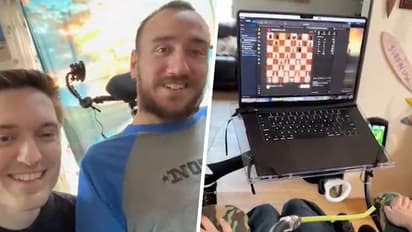Elon Musk's Neuralink enables first patient to control computer, play chess with his mind (WATCH)

Synopsis
Noland Arbaugh, the first Neuralink patient, paralysed below the shoulder, has been able to play chess using the brain-chip device, showcasing his control over the cursor with his thoughts.
Neuralink seeks to let people with impairments operate normally by using their minds. The first example of this brain chip technology at work was displayed in a live broadcast video on Wednesday. The video illustrates how the individual who received the first Neuralink brain chip implant can play chess on his laptop without using a mouse or keyboard and only his brain.
Bliss, one of Neuralink's developers, filmed the video, which allows everyone to witness the brain chip performing what it's designed to do in a live demonstration. Additionally, you can see in the video that Noland Arbaugh, the guy who had the brain chip implanted, talks about how he is paralyzed below the shoulders and is unable to use his fingers to control the mouse, which would allow him to play the game more naturally.
The person talks about his freak accident that happened 8 years ago, after which he dislocated his C4 and C5 which is near the base of the neck. The individual who has the brain chip also mentions the advancements in technology that have allowed him to perform tasks that he was unable to perform for a long time.
He was even able to stop the music playing in the background using his thoughts, which is rather impressive. The 9-minute film was broadcast through X, which is also owned by Elon Musk.
The complete procedure of the individual able to control the laptop’s cursor with his thoughts begins by learning to control these movements using the chip implanted in his brain. Arbaugh also discusses his experience playing Civilization VI for several hours, something he felt would never be feasible following his sad accident.
He also notes that the procedure to install the brain chip in him was simple, but that the technology need a lot of effort to become a viable source of therapy for many others like him in the future. Musk has spoken about the potential of his company's brain chip, and examples like these indicate that people with certain infirmities, such as being unable to sight, may be able to resume regular activities.
Find the latest Technology News covering Smartphone Updates, AI (Artificial Intelligence) breakthroughs, and innovations in space exploration. Stay updated on gadgets, apps, and digital trends with expert reviews, product comparisons, and tech insights. Download the Asianet News Official App from the Android Play Store and iPhone App Store for everything shaping the future of technology.